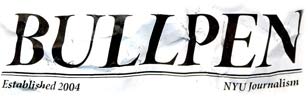Backgrounder: Nancy Shute
RELATED:
Nancy Shute, a senior writer at U.S. News and World Report, has studied literature and law, taught journalism, and worked as an editor, but she always welcomes an opportunity to return to her true craft: writing.
As a medical and science reporter, Shute, 51, has covered subjects ranging from global warming to preeclampsia, a dangerous complication of pregnancy marked by hypertension and high blood pressure. She is particularly drawn to stories that illustrate medicine’s impact on people, she told this reporter in an April telephone interview. In recent years, Shute has written about the threats posed by bird flu and the challenges of caring for New Orleans’ sick in aftermath of Hurricane Katrina. Her reporting on battlefield medicine in Iraq helped U.S. News and World Report win a National Headliners Award in 2001, one of the oldest annual awards recognizing journalistic merit.
Shute first dabbled in journalism in junior high school in Illinois. Her love of language led her to pursue a degree in English literature from Washington University in St. Louis. After graduating in 1976, Shute returned to reporting, landing a job with an ABC affiliate in Idaho, where she was first exposed to environmental reporting.
After three years in journalism, Shute returned to school to earn a Master’s degree in Law from Yale University. But on graduating in 1980, she opted to return to reporting, and “try making a living at it,” she told this reporter. Over the next year, Shute worked as Washington D.C. correspondent for three Alaskan newspapers, drawing on her knowledge of environmental law in her coverage of wildlife and conservation-related issues.
In 1983, Shute parlayed her environmental expertise into a freelance career. She spent the next 13 years “very happily,” writing articles on environmentally sensitive architecture, the difficulties of being a left-hander, and the world’s best white-water slalom canoe racer for Health, The Smithsonian, and The New York Times Magazine, among other publications.
Despite her success, Shute decided to quit freelancing in 1993 to accept a Fulbright grant to teach journalism in Kamchatka, Russia. She spent the next year teaching journalism and founding Kamchatka’s first independent newspaper.
On returning to the States, Shute landed a job as a medical reporter at U.S. News and World Report in 1996. She went on to serve as the magazine’s assistant managing science editor, and was promoted to senior writer in 2001.
Shute believes her responsibility as a journalist consists of “[being] out there trying to find out what’s new and what people should know,” she told this reporter. Her wide-ranging curiosity and the freedom she grants herself as a writer—specifically, the freedom to explore new subject areas—have sustained her interest in journalism throughout her 30-year career.
SOURCES
- Brink, Susan, Cannon, Angie, Querna, Elizabeth and Shute, Nancy. “Cheating Grim Death; Lightning-fast Treatment is the key to Success.” U.S. News & World Report. 29 Nov. 2004.
- Shute, Nancy. Telephone Interview. 13 April 2006.
- ——, “The Fear Factor.” U.S. News & World Report. 21 Nov. 2005.
- ——, “Under the Volcanos: The Door Opens to Russia’s Wild East.” ChicagoTribune. 21 Feb. 1993.

